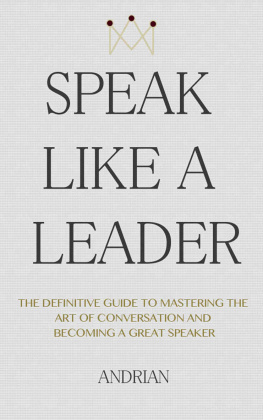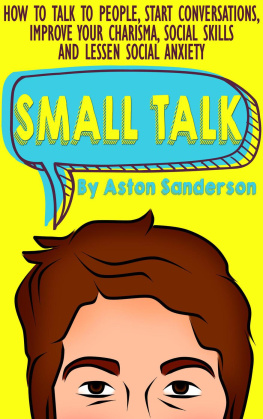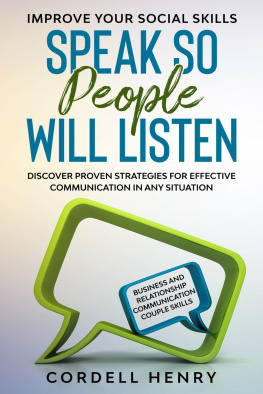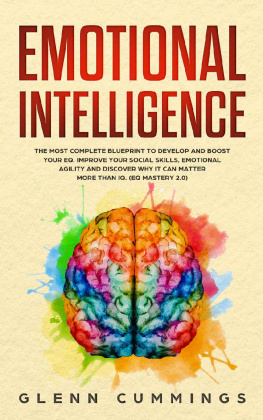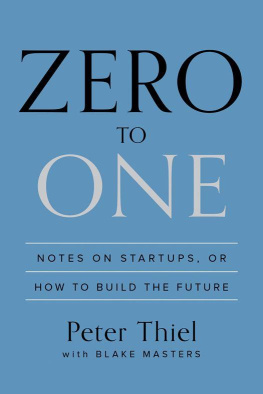Table of Contents
SPEAK LIKE
A LEADER
THE DEFINITIVE GUIDE TO MASTERING THE ART OF CONVERSATION AND BECOMING A GREAT SPEAKER
ANDRIAN
Copyright 2015 Andrian
All rights reserved.
To my parents and my brother for the eternal support they have provided in my journey so far. INTRODUCTION
W HEN I BEGAN introducing my close friends to the idea of a book to help you become a better speaker, they invariably asked one question: Andrian, what got you interested in writing this book in the first place? It wasnt something I had planned to do, nor was it the result of any long-term fascination with the topic. It was much more down-to-earth than that. It was an interest born of necessity, a need to successfully adapt to a totally new way of life.
I havent always been a good speaker, you know. I remember back in high school I was terrible at initiating conversations and interacting effectively with my classmates. This was illustrated in my final grades in Greek Language where, out of all the modules in which I was tested, this was my lowest grade. The problem intensified when, in my early twenties, I moved to London to complete my MSc. Imagine how difficult it was for me to step up my conversational skills whilst also trying to improve my foreign language ability.
Being initially unable to express myself the way I really wanted, I felt incompetent and sometimes even isolated. There were times when my professors ignored me because they couldnt understand my questions, times when my classmates didnt include me in planning our projects because I couldnt express myself the right way, times when girls didnt even want to speak to me because they couldnt understand what I was trying to say.
It wasnt because I lacked English language skills; it was so much more than that. It was about my ability to express myself in a simple but meaningful way; in a way that got people interested in what I had to say; in a way that evoked the right emotions and left people waiting, agonizingly eager, for the next words to come out of my mouth; in a way that made me relatable and empathic, and made people believe that what I was saying was of immense value to them.
Being good at speaking is an essential part of what makes us unique, memorable and helps us stand out. Unfortunately, I had to find this out the hard way. When you decide to compete at a high level and associate with the best, you must step up your game, or eventually you will be left behind.
Understanding this new reality was the turning point for me. It was what urged me to start researching the topic and apply my findings to real life scenarios in order to test what worked and what didnt. Many years later, I would use my findings to create intimate and meaningful relationships; to persuade people; to be an attractive man; to inspire and motivate others and to eventually become a confident individual with strong foundations in the way I argue, express and promote myself.
Speak Like a Leader is unlike any other self-help book on the market. It is based on the resources and research of experts in the field, combined with my own years of experience in my quest to become a better speaker. These two elements are the cornerstones of this book, which will ultimately help you to see the world from a different perspective.
A perspective where the way you speak is not just a conventional method of communication. It is a weapon that can be used in the pursuit of vivid, dynamic communications, where each and every human interaction resonates with information and becomes an opportunity to use language to enrich ones knowledge of what others think, feel, and intend to do. Receiving this knowledge will help you stand out among others; it will also protect you, inspire you and reveal previously hidden insights into human behavior.
1. AMBITION, MOTIVATION, EXTROVERSION AND OUR UNCONSCIOUS COMPETENCE PURSUIT
THE PARADOX OF AMBITION
I F YOU ARE not yet aware of Lars Von Triers masterpiece Nymphomaniac,' I highly suggest that you watch it. In this incredibly humanistic movie the award-winning director presents the life of Joe, a nymphomaniac trying to find a way to live a balanced life while fighting against her illness on a daily basis. Nearly halfway through the first part of the movie, in a moment of self-reflection, Joe makes an incredible statement:
Perhaps the only difference between me and other people was that Ive always demanded more from the sunset; more spectacular colors when the sun hit the horizon. Thats perhaps my only sin.
The very second I heard that sentence, I completely related to it. Was this because of my generally overly ambitious nature? Was this because I always demand more from myself and my environment? Was this because I had discovered a more romantic aspect of my personality? It doesnt really matter. What matters, is that this statement helped me discover a lot about the way that my mind works, and about how the minds of others work throughout our everyday lives.
The idea of demanding more from everything we experience is something that has been lost by our generation. Information overload, as well as the continual oversimplification of our everyday processes, has somehow pushed us towards new forms of communication. Texting, tweeting, snap-chatting, Vining and many other forms of simplified communication have overtaken our realities, and have clearly played a tremendous role in the way we use and experience verbal and written communication.
All of these developments have incrementally affected our ability to speak in a more pluralistic way, and are constantly leaving us in a hypnotized state that is unconsciously absorbing any desire to pursue a more ambitious nature. From my own experience, I can certainly say that ambition is probably the most important factor that affected my desire to develop a more charismatic and appealing speaking ability.
Why do I say that? Well, after many years of trying to decode the secret behind the art of conversation, I reached a very important conclusion: the main problem with conversation is that it takes place in real-time, and it is quite difficult to predict and control what you are going to say. This ubiquitous challenge is likely the primary force driving our pursuit of strong conversational skills.
THE UNCONSCIOUS COMPETENCE MODEL
As suggested above, the main problem with conversation is that it takes place in real-time, and it is difficult to control what you are going to say.
What an incredibly revelatory discovery. Think about it for a second. Speaking is an inherited skill, and most of us manage to reach quite a competent level without having to try particularly hard. The more you are exposed to a situation that necessitates the skill you want to develop, the higher the chances are that you will unconsciously develop a respectable level of ability in regards to this specific skill.
However, in order to achieve an extremely competent level of any skill, you must move beyond mere exposure to what I like to call Unconscious Competence Pursuit.'
This term didnt come to me organically; it was inspired by the four stages of competence model, introduced in the 1970s, by Noel Burch from the Gordon Training International [].

This model of training suggests that individuals are initially unaware of their incompetence in relation to the skill in question, but as they are introduced to its key principles and understand its importance, they can gradually move through different levels of competence, as they continue to practice it.
However, the key underlying element of the model described is that being exposed in such a process requires the individual to experience uncomfortable feelings throughout the learning stages. This exposure indicates that one is no longer within their comfort zone, but is embarking on a somewhat uncomfortable journey towards a truly desirable state of mind.
Next page
